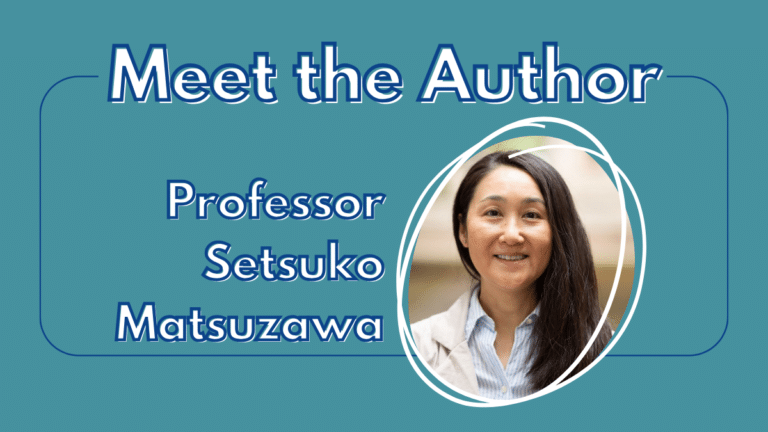
Editorial Note: This interview feature was curated as part of Sociological Inquiry’s “Meet the Authors” campaign with a goal of celebrating and publicizing the scholarship of Sociological Inquiry (SI) authors. This feature was made possible through a collaboration between AKD’s Media Editor, Dr. Stephanie Wilson, and the following SI author:
- Setsuko Matsuzawa, Professor of Sociology, Sociology and Anthropology Department, The College of Wooster.
Thank you to Professor Setsuko Matsuzawa for her participation in this campaign!
Anti-Asian Racism in Japan
The Beheiren movement was Japan’s first transnational anti-war movement. To better understand the nuances of anti-Asian racism in Japan and the country’s own confrontation with it, sociologist Dr. Setsuko Matsuzawa conducted archival research of The Beheiren News, the movement’s newsletter, which documented many reflections on Japan’s own oppressive and imperialist practices toward other Asian groups and nations. Matsuzawa’s research was recently published in Sociological Inquiry‘s Special Issue on Transculturality of Anti-Asian Racism.
Continue reading for more on this insightful analysis!
Meet the Author
The following is an exclusive interview with the article author, Dr. Setsuko Matsuzawa. Below, Matsuzawa shares behind-the-scenes insights into her article “Confronting Japan’s Anti-Asian Racism: The Transformation of the Beheiren Movement’s Identity during the Vietnam War.”
Can you briefly describe your most recent publication in Sociological Inquiry, including its purpose and a summary of major insights or findings?
The purpose of this article is to examine the transcultural formation and transformation of the movement’s identity by exploring the perceptions of Beheiren intellectual leaders on the Vietnam war, their self-reflections, and their racialized discourses on U.S. aggression and Japan’s own aggressor roles.
Beheiren leaders’ transcultural interactions with both Korean detainees in the Omura Detention Facility in Japan and members of the Black Power movement in the U.S. helped them to develop an antiracist consciousness toward fellow Asians beyond the context of the Vietnam war. While their interactions with Korean detainees forced them to examine Japan’s internal structural oppressions against fellow Asians (e.g., Korean residents in Japan) and fellow Japanese (e.g., the Okinawans), their interactions with the Black Power movement raised their awareness of antiracism and Third-Worldism.
These interactions were necessary to transforming the movement’s identity, resulting in a confrontation with its own anti-Asian racism in the local cultural context of Japanese society as well as in the form of economic imperialism in Asia.
How were you introduced to the topic of the publication discussed above and what motivated you to study the topic as a social scientist?
Initially, I was looking at Japan’s student movements in the 1960s, which constituted some of the most volatile and radical movements of the past sixty-five years in Japan. While student and New Left movements engaged in contentious protests, I was drawn to the Beheiren movement, an intellectual-led nonviolent movement against the Vietnam war, which attracted a wider segment of ordinary Japanese. As I studied archival materials, I noticed that the movement’s identity was transformed due to the movement’s transcultural interactions with Korean detainees in Japan and the Black Power movement in the U.S., resulting in a call for resistance to anti-Asian racism beyond the context of the Vietnam war. Addressing the movement intellectuals’ realization of Japan’s internal structural oppressions against fellow Asians and fellow Japanese was particularly what motivated me to write this article.
How does your publication challenge social scientists to look anew at traditional areas or identify novel areas for investigation?
I also believe that this article will shed light on the transnational effects of the Black Power movements in the U.S. on non-socialist Asian countries and their contributions to shaping the global activism landscape.
How does your publication challenge members of society more broadly to deepen their understanding of the topic of your paper?
My article challenges the existing literature by addressing more of Beheiren’s involvements in Okinawa and their thoughts on Okinawa. I disagree with scholars who take on Okinawa being not a central focus of Beheiren apart from the military bases. Beheiren regarded the historical and contemporary oppression of the Okinawans by Japan and the U.S. as akin to Blacks in the U.S. Beheiren aimed at attacking this racist structure, which went beyond the mere existence of military bases. Beheiren had considered Okinawa “liberation” as a critical part of Third-Worldism and wanted to liberate the Okinawans from such oppression.
If you had to choose one major takeaway from your paper to share, what would it be?
Beheiren leaders’ transcultural interactions with the oppressed and other activists helped them to grow an antiracist consciousness toward their fellow Asians, which transformed their movement identity.
Learn more about submitting your work to Sociological Inquiry by reviewing our Author Guidelines!
